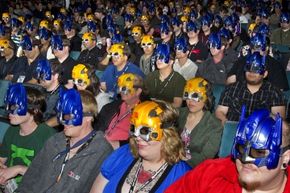Despite a generally disappointing year at the box office, 2014 produced one record-breaking blockbuster: "Transformers: Age of Extinction," the fourth installment in the toy-inspired Transformers series. That film alone brought in more than $1 billion in worldwide box office ticket sales.
The movie received generally terrible reviews, and it ranks embarrassingly low on Rotten Tomato's Tomatometer of positive critical response. And, as part of the series, "Transformers: Age of Extinction" did not live up to the popularity of its predecessors in the U.S. With a total box office of $241.2 million domestically (meaning in the U.S. and Canada), it had the lowest domestic gross in the "Transformers" franchise.
Advertisement
Any lack of interest in this part of the world, however, was more than made up for at the international box office, where gross revenues totaled $763.8 million. The film was tremendously popular in China, where it became the country's highest grossing film of all time, the first ever to gross more than $300 million there [source: McClintock].
If you want to learn how the Hollywood box office works, the fourth Transformers installment is an interesting case. Paramount, the studio backing the film, was accused of overestimating box office totals during the film's opening weekend. Paramount said the movie raked in $100.38 million, in line with expectations that it would exceed $100 million, but box-office watchers came up with a different tally — closer to $97.5 million [source: Busch].
Estimates are part of how the Hollywood box office works, but there is also a tracking system that provides more exact figures. So why do studios continue to report estimated weekend box office totals to the media on Sunday before providing accurate totals on Monday? One reason is that not every ticket sale is tracked automatically; there's a lag in reporting time for a chunk of North American theaters. The other and perhaps more important reason is that the box office has become part of the news, and the media reports weekend totals on Sunday. If estimates get slightly puffed up, it only helps a movie's reputation, and news outlets are unlikely to report updated numbers on Monday.
It's all part of the how the Hollywood box office works, and estimates are usually pretty accurate. In fact, "Transformers: Age of Extinction" is the first major example of number-fudging since 20th Century Fox was accused of inflating estimates for the 2002 release of "Minority Report," allegedly to avoid the embarrassment of being bested by its animated box-office competitor, "Lilo and Stitch" [source: Ackman].
When you consider that the fourth Transformers film already had the highest opening weekend of the year, before the controversy, and then went on to become the highest grossing film of 2014 after just two weeks of release, it doesn't seem worth it to lie about just $3 million (after all, we're talking Transformers money). For the studio, however, it could have been more about the perception of what it means to pass the $100 million mark.
Hollywood's bar for success changes, but these days hitting or missing $100 million on the opening weekend can mean the difference between a verifiable hit and an arguable flop. There was even said to be insider speculation that if Transformers 4 did not make $100 million its opening weekend, there would be layoffs at the studio [source: Busch]. That's a lot of pressure on one movie, but history has shown that the autobots can bear the weight. In fact, Transformers movies are expected to break records. As that audience grows in other countries, blockbuster success and enormous box office numbers during opening weekend have become part of a movie's promotional campaign. Bringing in less than estimated box office numbers during the first weekend could send the wrong signals to the media and, by extension, the audience.
Let's look at how — and why — Hollywood continues to play fast and loose with box office numbers.
Advertisement





